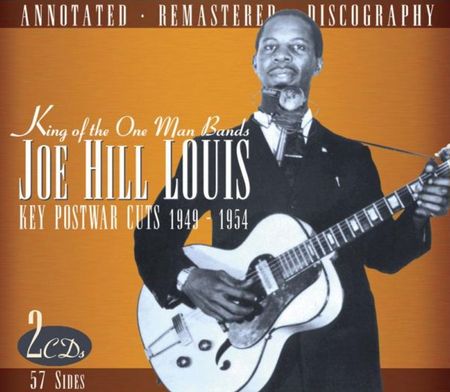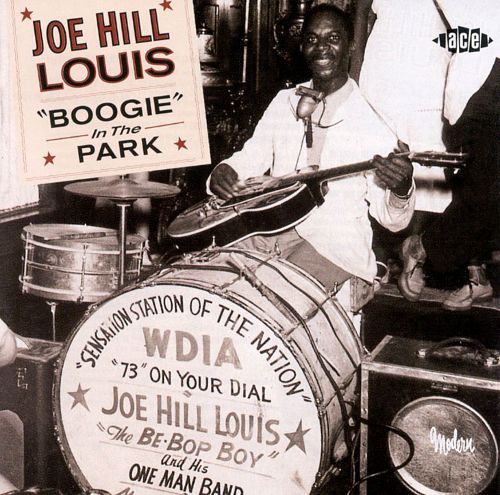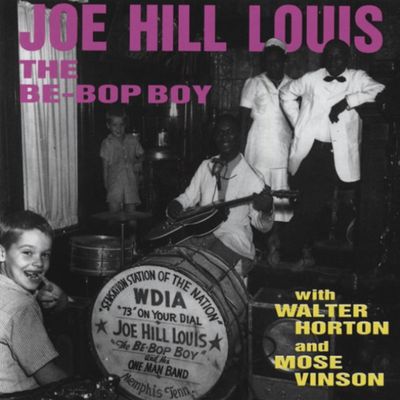Leslie Hill
b. September 23rd, 1921 in Raines (Tennessee)
d. August 5th, 1957 in Memphis (Tennessee)



KING OF THE ONE MAN BANDS
JSP
November 1949 - 1954
BOOGIE IN THE PARK
Ace
July 1950 - February 1953
THE BE-BOP BOY
Bear Family
February 1952 - May 1953
Leslie Hill grandit au milieu de trois frères et soeurs dans la banlieue sud de Memphis. A la mort de sa mère, il est élevé par une belle-mère qui le maltraite. Il s'enfuit de la maison familiale et est recueilli par Billy and Drew Canale. Joe commence, d'abord, par jouer de l'harmonica puis, ensuite, apprend la guitare et la batterie. Il se produit dans la région de Memphis dans les juke-joints, au Peabody Hotel, au Handy Park. Pour WDIA, Joe reprend l'émission radiophonique de B.B. King "The Pep-ti-con Boy", un sobriquet qui sera vite transformé en Be-Bop-Boy. Ses premiers enregistrements ont lieu en novembre 1949 pour Columbia ("A jumpin' and A shufflin'", "Joe's jump"). Mais, peu après, il est remarqué par Sam Phillips qui vient de fonder le Memphis Recording Service. Phillips va enregistrer substantiellement Joe Hill Louis pendant trois ans gardant les titres pour ses propres labels (It's the Phillips, Sun) ou les vendant à d'autres (Modern, Kent, Checker). Le public noir découvre alors ce one-man band (c'est à dire qu'il joue de tous les instruments en même temps) délivrant des blues bruts et superbement terriens, souvent rythmés et excitants. Ses premiers morceaux (souvent publiés par Modern) sont réellement mémorables : "Gotta let you go", "Boogie in the park", "Nappy head woman", "I feel like a million", "Train ticket", "Street walkin' woman", "Blue in the morning". Souvent dans une configuration one-man band, il s'associera épisodiquement avec d'autres musiciens de la ville comme Walter Horton, Jack Kelly, Willie Nix, Albert Williams, Mose Vinson. En juillet 1952, il se marie avec Dorothy "Ruthy" Mae Pearson. Par la suite, Joe grave pour Sun ("She may be yours", "Hydramatic woman"), Meteor ("On the floor") et Ace ("4th and Beale"). Il passera rapidement aussi par le label Rockin' (dirigé par Henry Stone). En 1955, il propose un simple pour Vendor (produit par Drew Canale). Malheureusement, il décède du tétanos à 36 ans. Les trois sélections présentées ici dressent un panorama convaincant de son oeuvre, la plus complète étant celle proposée par le label anglais JSP.
Leslie Hill grew up in the midst of three brothers and sisters in the southern suburbs of Memphis. At the death of his mother, he is brought up by a mother-in-law who maltreats him. He runs away from the family home and is picked up by Billy and Drew Canale. Joe begins, first, by playing harmonica then learns guitar and drums. He performs in the Memphis area in juke-joints, at Peabody Hotel or Handy Park. For WDIA, Joe takes over the B.B. King's radio program "The Pep-ti-con Boy", a nickname that will soon be transformed into Be-Bop-Boy. His first recordings were in november 1949 for Columbia ("A jumpin' and A shufflin'", "Joe's jump"). But, shortly after, he is discovered by Sam Phillips who founded the Memphis Recording Service. Phillips will record Joe Hill Louis substantially during three years keeping the titles for his own labels (It's the Phillips, Sun) or selling them to others (Modern, Kent, Checker). The black audience then discovers this one-man band (i.e. he plays all instruments at the same time) delivering raw and superbly down-home blues, often rhythmic and exciting. His first songs (often issued by Modern) are truly memorable : "Gotta let you go", "Boogie in the park", "Nappy head woman", "I feel like a million", "Train ticket", "Street walkin' woman", "Blue in the morning". Often in a one-man band configuration, he will occasionally associate with other city musicians such as Walter Horton, Jack Kelly, Willie Nix, Albert Williams and Mose Vinson. In july 1952, he married Dorothy "Ruthy" Mae Pearson. Subsequently, Joe cut for Sun ("She may be yours", "Hydramatic woman"), Meteor ("On the floor") and Ace ("4th and Beale"). He will also quickly pass by Rockin' label (directed by Henry Stone). In 1955, he proposed a single for Vendor (produced by Drew Canale). Unfortunately, he died of tetanus at 36 years old. The three selections presented here give a convincing overview of his work, the most complete being that proposed by the English label JSP.